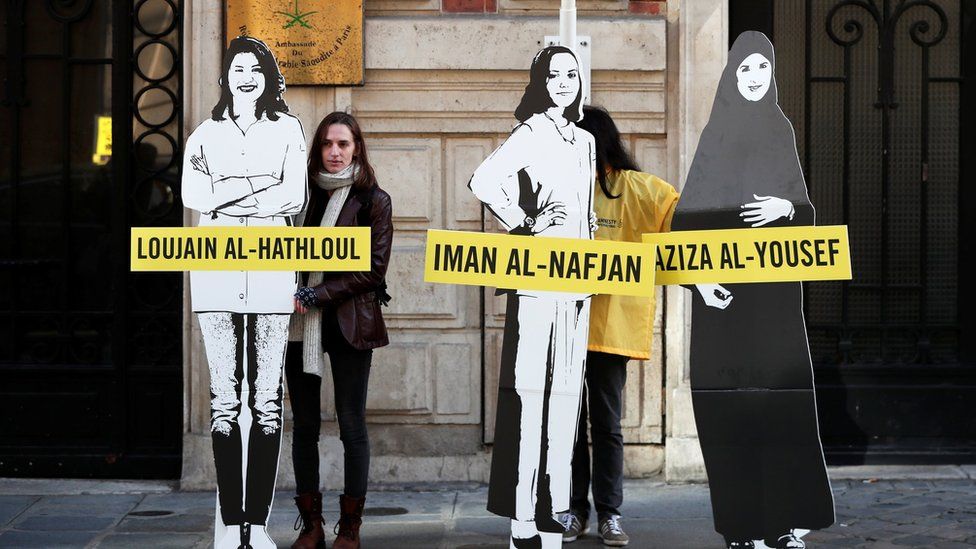Saudi Arabia puts women's rights activists on trial
- Published

Ten women's rights activists have gone on trial in Saudi Arabia in a case that has raised questions about the kingdom's human rights record.
Those who appeared included Loujain al-Hathloul, a prominent figure in the campaign to win Saudi women the right to drive. She was detained last May.
A UK-based Saudi rights organisation, ALQST, said they were charged under the country's cyber-crimes law.
Demands for the women's release have come from around the world.
Last week more than 30 countries at the UN Human Rights Council criticised Saudi Arabia for detaining the women.
Scrutiny of human rights in the kingdom has intensified since the murder of journalist Jamal Khashoggi at the Saudi consulate in Istanbul last October.
What happened in court?
Prominent rights activists Aziza al-Yousef, Eman al-Nafjan and Hatoon al-Fassi joined Ms Hathloul and six others in the criminal court in Riyadh on Wednesday, the court's president confirmed.
According to ALQST, the women were charged in three separate sessions with crimes under the country's cyber-crimes law, which can carry a sentence of up to five years in jail.
Allow Twitter content?
This article contains content provided by Twitter. We ask for your permission before anything is loaded, as they may be using cookies and other technologies. You may want to read Twitter’s cookie policy, external and privacy policy, external before accepting. To view this content choose ‘accept and continue’.
The rights body said none of the women were granted access to lawyers, and the charges were based on "a string of alleged confessions that the women had been in contact with human rights organisations".
Foreign journalists and diplomats were barred from attending the closed session, though family members were allowed in.
Activists' relatives said they were told last minute that the trial had been switched to the criminal court from the Specialized Criminal Court, which was set up to try terrorism cases. The reason for the decision was not clear.
The Gulf Centre for Human Rights has warned that the women might not get a fair trial and said it was "deeply concerned" about their wellbeing.
Four of the women have alleged they were tortured whilst in detention, including with electric shocks and whippings, and were sexually harassed and assaulted. The Saudi deputy public prosecutor has said the allegations are false.
Decades of human rights issues
Analysis by BBC security correspondent Frank Gardner
Saudi Arabia has an enduring problem with human rights and, sadly, the case of the detained women activists is only the tip of the iceberg.
In practices that have been going on for decades, citizens detained by the authorities can be held incommunicado, denied access to lawyers, kept in the dark about the charges against them and, most worryingly, abused during interrogation and coerced into signing confessions.
The Saudi government's reaction is almost invariably the same - it denies all allegations of torture, it fails to punish those who carry it out, and it rejects all international criticism as "unjustified interference in its internal affairs".
Saudi Arabia does have, more broadly, some legitimate security concerns. But putting on trial women who campaigned for the right to drive or win equal rights to men is doing it no favours in world opinion.
How did this begin?
The detentions of more than a dozen activists, including several men, began last May, shortly before the driving ban was lifted.
At the time, the public prosecutor's office said they were suspected of harming national interests and "offering support to hostile elements abroad". Some of the activists were later released.
Saudi officials have accused critics of interfering in the Gulf kingdom's domestic affairs "under the guise of defending human rights".
Last August, Saudi Arabia froze trade ties with Canada and expelled its ambassador in response to calls to release the detained activists.
At the time, the Office of the UN High Commissioner for Human Rights said at least 15 human rights defenders and women's rights activists critical of the Saudi government had been arrested or detained arbitrarily since 15 May.
Also among the detained women is the Saudi-American human rights campaigner Samar Badawi, sister of jailed blogger Raif Badawi.
Ms Badawi, who was given the US International Women of Courage Award in 2012, is known for challenging Saudi Arabia's male guardianship system.
Raif Badawi was sentenced to 10 years in prison and 1,000 lashes for "insulting Islam" online in 2014. His wife, Ensaf Haidar, lives in Canada and has become a Canadian citizen.
- Published7 February 2019
- Published13 January 2019
- Published10 January 2019
- Published9 January 2019
- Published8 January 2019
- Published24 February 2021
- Published6 August 2018
- Published23 May 2018
- Published20 May 2018
- Published6 June 2017